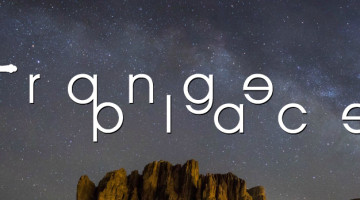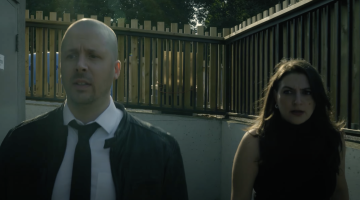It’s always been difficult for adults to cope with unexpected change, but that task is even harder for children who haven’t yet had to confront the responsibilities and challenges faced by their grown-up counterparts. As the coronavirus pandemic continues to linger, and as the fight for an equal society continues amid unspeakable police brutality in America, families around the world have had their emotional well-being tested by the volatility of life in 2020.
Despite the uncertainty of this situation, the value of personal self-care is immeasurable. For many in the entertainment industry, the limitations of life under quarantine have motivated actors and filmmakers to create intriguing new content that otherwise would have been unimaginable under typical circumstances.
One of those filmmakers is New York City-based actor/puppeteer Laura Kay, the creator of a new family-oriented web series that’s been praised for helping kids and adults alike to deal with life’s problems through the practice of self-care: Petunia’s Playhouse. Created by Kay (who performs the friendly title character) and streaming on YouTube and Instagram, the show’s first season features 5 episodes that teach viewers easy-to-follow strategies on setting personal boundaries, creating positive affirmations, establishing positive intentions and practicing gratefulness.

Petunia, the friendly and caring host of web series PETUNIA’S PLAYHOUSE, now streaming on YouTube and Instagram. Petunia is performed by the show’s creator, Laura Kay.
Petunia’s Playhouse‘s web site (link below) also features downloadable and printable content which illustrates those strategies in practice through easy-to-do exercises, plus links to specially designed apps, informative articles and in-depth books on self-care and mental health.
Though the series has finished its initial run, Petunia’s Playhouse‘s digital presence will continue in the next few weeks with additional content, and another season of the acclaimed program is in development.
Using only the craft supplies that were inside her apartment, Kay constructed not only Petunia but also the colorful playhouse that she inhabits with her best pal Pumpkin Duck. Kay simultaneously filmed and performed their segments, while also handling audio and editing duties on those segments.
Adding a human connection to Petunia’s Playhouse are some of Kay’s real life friends from the creative world, who in turn appear as Petunia’s friends: actors Ashley Kristeen Vega, Jeff Gorcyca, Frank Gambino Jr., theatre director Christina Rose Ashby and playwright Julia Rae Maldonado. Each of them contribute their own questions relating to the subjects discussed in every episode.
In creating the series, which has recently been named an official selection of the KIDS First! Film Festival, Kay believes that children and their families will find meaningful ways to respond to whatever obstacles life puts before them. Yet while she and her professional colleagues in the Broadway community have had their livelihoods stalled by the coronavirus lockdown, Kay, who’s bravely battled with mental health difficulties throughout her life, finds that the work she’s done in bringing Petunia’s Playhouse to the small screen is its own kind of self-care.
SR: What inspired you to create Petunia’s Playhouse?
Laura Kay (creator/writer/producer/puppeteer, Petunia’s Playhouse): I was inspired mostly by my friends, who were all in a state of panic when the pandemic started. I felt like I had a lot of self-care tricks hidden up my sleeves, and had actually started making lists for some friends of some ways they could “stay sane” during lockdown. I also know what it’s like to have a mental illness and feel like I have no resources. I wanted to create something that was accessible to everyone, that would help not only the people in my life that I love, but everyone suffering right now as a result of this pandemic.
 SR: How did you come up with and develop the show’s concept and characters?
SR: How did you come up with and develop the show’s concept and characters?
LK: Petunia came to me back in 2018, when I took a class with the Brooklyn Puppet Conspiracy. David Fino (puppeteer/founder of The Brooklyn Puppet Conspiracy) built her, and as soon as I saw her, I just instinctively knew her name was Petunia.
I was sitting in class one night, and I just jotted something down in my notebook: “Petunia’s Playhouse – puppet teaches people things.” It kind of sat on the back burner for a while, because I didn’t really know what exactly I wanted Petunia’s to teach, or how, but the name just stuck with me.
When the pandemic started and (residents of) New York City (were) told to shelter in place, I had a lot of conversations with my friends about trying to stay healthy during quarantine, and ways we could take care of ourselves. Then I saw Petunia on my shelf and thought, “you know, I’ve done a lot of work over the past several years on my own mental health. I have a lot of knowledge I could share, and I think, right now, people need something happy. They need Petunia to teach them self-care.”
From there, it was a lot of looking around my apartment and seeing what I had to work with: who could be her friend? Pumpkin Duck was sort of a happy accident – a friend suggested it on a video call, and now Pumpkin Duck is a beloved staple of the show.
SR: Each episode comes with helpful exercises for viewers – children and their families – to practice self-care during these times. Discuss how you developed those exercises, and how viewers of the show have already benefited from doing them.
LK: The exercises, I think, are a critical aspect to Petunia’s Playhouse. When on my own mental health journey, I found that in order to create new healthy habits, I needed some structured exercises, workbooks, and journals. I developed the exercises based on some of my own journaling and questions I ask myself, plus I used some great resources that are listed on the Petunia’s Playhouse website! Viewers like these exercises because they are easily accessible, and don’t require lots of time. They encourage you to start thinking in a different way, and folks who have done the exercises said that they feel more centered and positive.
SR: In what ways has making this show helped you not only to cope with the uncertainty of life amid the coronavirus, but also the challenges of your own mental health situation?
LK: This show has truly been my saving grace. It’s been my one constant since the lockdown started. Typically, I’m out auditioning in New York City and working for a Broadway general management company. Since the beginning of the shutdown, the Broadway shutdown has been extended several times, and I have no idea when theatres will reopen or when I can go back to work. Waking up every day and going to work on Petunia has given my days purpose, and has filled me with a lot of joy.
My mental illness is tricky, and if I stay unproductive for long periods of time, I tend to slip into a depression that is nearly impossible to climb out of. I’ll admit, when the pandemic started I was fully prepared to slip into depression mode, but working on Petunia’s Playhouse has given each day purpose, and has kept me busy, and kept me generally happy (or as happy as you can be in these times)!

Actor/puppeteer Laura Kay, the creator of acclaimed web series PETUNIA’S PLAYHOUSE.
SR: You filmed the entire season of shows while sequestered in your apartment during the lockdown, and using the resources you had around your house to produce each episode. What was that experience like, and how did working within those limitations ultimately help you in a creative sense?
LK: I will say that one of the silver linings of being stuck at home with very little resources is that I just had to make do with what I had. I’m a perfectionist, and I feel like if we were in normal circumstances, I could’ve spent a month at the craft store trying to find the perfect color construction paper, but I couldn’t. I had to make quick decisions, adapt, and make something with what I had.
I spent no money on the production of Petunia’s Playhouse, aside from my Adobe Premiere Pro subscription and an app I bought to use my iPad as a monitor. I think, ultimately, my limitations made the show better. I learned so much in a short amount of time! I never would’ve learned as much as I did if I had more resources available to me. I think that’s so valuable.
SR: Describe the production process, from the construction and performance of Petunia to the set design and how you found people to share their stories in each episode.
LK: The set design was actually a fun process. I walked around my apartment with a reusable shopping bag and literally just gathered anything that looked cute, pink, miniature, or was an art supply. I had made the episode graphics first, so I sort of used those as a guide: plants, flowers, cats, books. Bright colors. Pinks, purples, and blues. The backdrop is a simple pink photo backdrop I bought years ago. I used whatever I had on hand – paperclips, tape, whatever – to make it work. I can’t tell you how many times that window fell off the backdrop while I was filming. But, I just rolled with it.
Filming each episode was the trickiest part. As a puppeteer, your main goal is to stay hidden, and you need a monitor that’s showing you the video feed so you can watch the puppet and make sure you’re positioned correctly, staying in frame, and looking at the camera. Because I was shooting on an iPhone, I had to find an app that would allow me to use my iPad as a monitor. I also was recording sound at the same time onto my computer. So, it was a laborious process, but ultimately I found a system that worked.
The artists featured in this season are all friends of mine who generously donated their time. I thought what would make things easiest is if I took the issues that I knew many of my friends were having (including these actors and artists) and wrote little scripts for them. That way, they could contribute to the project without feeling like they were being asked to share their own personal issues.
I reached out to Christina, Julia, Jeff, Ashley and Frank because I knew they would approach the project with honesty. Not all of them are actors by trade, either. I wanted real people to represent very real issues people are facing right now.
 SR: What’s the reaction been to Petunia’s Playhouse thus far, and how can shows like yours ultimately help children and their families to cope with the challenges of life today?
SR: What’s the reaction been to Petunia’s Playhouse thus far, and how can shows like yours ultimately help children and their families to cope with the challenges of life today?
LK: The reaction has been overwhelmingly positive, which honestly makes my heart so happy! The series is picking up some traction and people are spreading the message and sharing the episodes. I think content like this is really important because it provides viewers with practical, achievable things they can do every day to improve their mental health.
I think often, the “self-care Industry” makes self care seem unattainable, or something that’s not for everyone. But content like Petunia’s Playhouse proves that you can take 5 minutes each day to practice self-care, for free, and even doing that will have a lasting effect. My hope is that parents and their children will work on these exercises and concepts together. Parents need to be mentally healthy, too! Everyone needs to. If we are going to survive these turbulent times, we all owe it to ourselves to take the time to learn self-care, and teach it to children.
SR: How can your experience making Petunia’s Playhouse inspire other creatives whose livelihoods and mental health have been upended by the coronavirus lockdown to maintain their creativity while also taking the time to care for themselves?
LK: I will first say that I am constantly learning, even now, how to balance creativity and self-care. There were days where I worked on Petunia’s Playhouse for 12 hours straight and then had to force myself to take a break and walk away to preserve my own mental health. It’s a process, always.
If I could say one inspirational thing to other creatives, I’d say…just do it! Just make your art! You don’t have to spend thousands of dollars and have the best equipment on the planet for your project to impact others. If you believe in your message, and work hard, and solve problems creatively, then you’ll make something wonderful. It’ll probably be even better than what you set out to do. Just make sure to take breaks, listen to your mind and body, and check in with yourself!
 SR: What are your main hopes for the show’s success?
SR: What are your main hopes for the show’s success?
LK: I hope Petunia’s Playhouse continues to grow and grow, and that Petunia’s messages of self-care continue to reach more people. This is only the beginning, and I can’t wait to see where we go! Most importantly, I want to help as many people as I can.
SR: Finally, will the show be closed-captioned/subtitled?
LK: This is a great question! I think, as I search for ways to make the show (and mental health resources in general) more accessible for folks, adding subtitles/closed-captions would be an important step.
I am constantly learning about the ways that people consume content on the internet, and I think adding subtitles would allow even more folks to enjoy Petunia’s Playhouse, and would speak to our message of inclusion. I think that’s a great next step for season 1!
ON THE WEB: https://www.petuniasplayhouse.net/
YOUTUBE: https://www.youtube.com/channel/UCNxAvhzB9hJ8Rm8hkIOnbvg
FACEBOOK: https://www.facebook.com/petuniasplayhouseseries/
INSTAGRAM: https://www.instagram.com/petuniasplayhouseseries/










No Comment